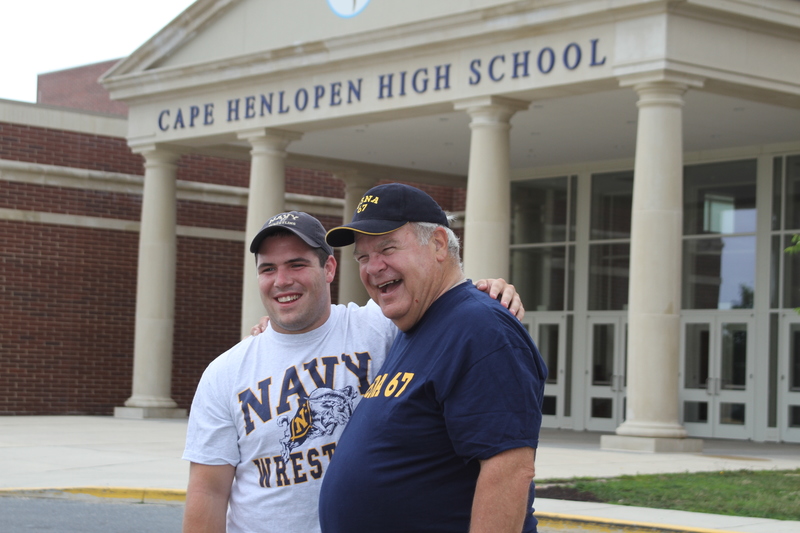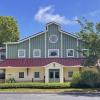Retired Navy pilot and 1967 Annapolis graduate Jim Barrett has plenty of experience rescuing people at sea. Once, he and his 12-man crew rescued two French sailors whose sailboat had sunk during a Bermuda-to-France race.
Once the castaways were spotted, his crew tossed the lost sailors - who had been bobbing in the Atlantic for 27 hours - a life raft, and contacted a nearby freighter to turn back and pick them up. When Barrett retired in 1987, he thought his days of search and rescue were over.
That was until he signed up to mentor Thomas Ott. Ott, a star athlete and honor student at Cape Henlopen High School, wasn’t lost at sea. But he definitely was dealing with a multitude of challenges. What they accomplished together over the next two years resulted in Ott’s appointment to the Naval Academy and a bond that’s stronger than the three-time state wrestling champ’s grip.
Three-sport star
At first glance, Thomas Ott seemed to have it all. An all-stater in football and lacrosse and a three-time wrestling champion at 220 pounds, he was also an excellent student and popular with his classmates, teachers and coaches. “When I met Thomas, his athletic reputation had preceded him,” said Barrett. “He had a great personality and was all-state in three sports. His football coach, Bill Collick, told me he was the strongest kid on the football team as a sophomore. With all his prowess in football and wrestling, Thomas tells me his favorite sport is lacrosse. Go figure,” Barrett said with a laugh.
But with so much going his way, Ott was also dealing with some agonizing issues. His father was in jail for sexual assault, and that ordeal, along with the normal stress of being a teenager, had thrown his life out of balance.
“Although Thomas had a lot of support from his family, teachers and coaches, I think he was looking for someone to be real with him and talk about life in general and not dwell on some of the negatives he had experienced. Thomas taught me to listen to what he was saying, to pay attention. It was the kind of questions he asked that showed how insightful he was,” said Barrett. “He has faced adversity in his life. And we talked about that and how he handled it. He made some mistakes along the way but ended up doing the next right thing.”
Doing the next right thing
If Jim Barrett ever writes his memoir, the title should be “Do the Next Right Thing.” It’s the mantra he follows in his own life and continuously challenges his mentees to emulate. Both Ott and his best friend, Andrew Grau, another Barrett mentee and a Cape tight end who received a football scholarship to the University of Delaware, used the term frequently as they explained what they learned from Barrett and how they deal with the pressures of life.
“I learned many lessons at the Naval Academy,” said Barrett. “I learned that success happens when preparedness meets opportunity. I learned the importance of telling the whole truth. I learned the importance of integrity. And I learned the importance of doing the next right thing. It’s served me well, and I think it will serve Thomas and Andrew as they move on with their lives.”
Ott has been intrigued by the Naval Academy since a teacher told him about it in middle school. When his high school guidance counselor told him about the Rotary Mentorship Program, and that one mentor was an Annapolis grad, he was sold. “Everyone has adversity in their life,” said Ott. “Each person has different problems. It’s not the adversity that’s important, but the way you handle it. In my case, it was doing the next right thing. Doing my homework was the next right thing. Going to class was the next right thing. Doing the proper work on the athletic field was the next right thing.”
Ott is now attending the Naval Academy Prep School in Newport, R.I. He will enter Annapolis next year, where he plans to wrestle. He is still deciding his area of study.
Go Navy
In 1963, at age 17, fresh from his own high school graduation from Towson High in Maryland, Barrett entered the Naval Academy and began training to become a Navy pilot. At 19, he made his first carrier landings and couldn’t believe the Navy was paying him to fly its jets. He adjusted quickly to the strict Annapolis regimen after coming from a very restrictive family environment.
“I remember during plebe year when most of the other freshmen were bitching about all the rules, restrictions and penalties there were, I wrote a letter to my Dad telling him how much I was enjoying my newfound freedom. So it’s your attitude that’s going to get you through. The way I looked at it, sure, there were rules and accountability, but it allowed me to ride in jets, drive ships, storm beaches and travel the world [London, Paris, Copenhagen, Spain, Germany and Italy before age 21]. And they were paying me to do it!”
Barrett spent most of his career as a Navy pilot working with men and women in their late teens and early 20s. So he had experience working with young people. “I open up to them, and it makes it easier for them to open up to me,” he said.
During his 24 years in the Navy, he participated in several at-sea rescues. But most of his flying time was spent tracking Soviet submarines in the Atlantic Ocean. As a P-3 Orion Plane Commander, he and his crew routinely flew 14- hour missions tracking their Cold War adversaries.
When his first wife died at a young age, Barrett stopped flying and stayed ashore to raise his two young sons. After retiring from the Navy, Barrett owned several businesses including a computer company, and a bed and breakfast. He also taught college courses and flipped houses, and he now sells real estate in the Lewes area.
Service Above Self
Wanting to give back to the community, Barrett joined the Lewes-Rehoboth Rotary Club, and that led to the mentoring opportunities. He has mentored seven students over five years. He volunteered because he felt he had the experience to help positively impact young people’s lives, especially those without father figures. Barrett was recently recognized for his efforts by the State of Delaware through a House Resolution.
“Rotary is all about giving back to the community. Because of my experience I think I’m able to give life and career advice to young people like Thomas and Andrew. I am gratified that these teenagers actually listen. I think the bonds we formed will last a lifetime,” said Barrett. And as Thomas and Andrew continue their life journeys, Barrett can be confident that regardless of the adversities they face, the losses and disappointments they experience, they will always be striving to do the next right thing.
Note: This article previously appeared in Delaware Beach Life Magazine.




















































